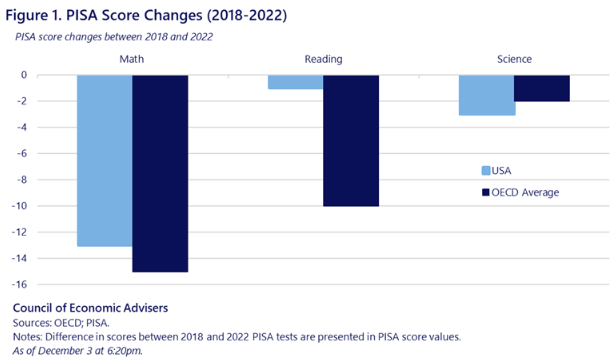U.S. students’ test scores slumped on international reading, math and science assessments, with historically dismal results in math. But American students’ declines on the Program for International Student Assessment (PISA) were smaller than those in most other countries, so our international rankings improved in all three subjects. The Biden Administration credited billions of dollars in additional pandemic-era education spending for stemming the losses.

Why it matters: One of the most valuable uses of international assessments is the chance to scrutinize American assumptions around teaching and learning.
Many disadvantaged students are not given access to rigorous math instruction, starting from a young age, said Shalinee Sharma, the chief executive of Zearn, a widely used math platform for elementary and middle school students.
Unlike some countries that embrace math as a learned skill, the United States tends to treat math as a talent — designating only certain students as “math kids,” she said. That philosophy can especially hurt low-income students.
“When they do get access to high-quality math learning,” she said, “they excel.”
Numbers to Know
65%: Share of students in OECD member countries (largely industrialized democracies) who report feeling distracted by digital devices during math lessons.
45%: Proportion of students who reported feeling nervous or anxious if their phone wasn’t nearby.
7: Percentage point decline, from 2018 to 2022, in the proportion of American students who say they feel “like an outsider” at school.
$2,625: Estimated cost increase, per student, of fully implementing New York City’s new class size caps in elementary schools.
$213.3 million: Amount of third-round pandemic relief funding North Carolina school districts spent on HVAC upgrades.
Key Findings
Chronic absenteeism is up across the board, but especially among rural and Latino students.
Participating in centralized enrollment in New Orleans’ all-charter public school system made schools more accessible to nonwhite students and had little impact on their state accountability ratings.
Geographic preferences and sibling preferences for access to New Orleans charter schools disproportionately tend to favor white students.
A California “right to read” lawsuit prompted changes that improved reading instruction.
Oakland community members trained to work as literacy tutors were just as effective as teachers in boosting student reading results.
The Last Word
When we can’t or don’t talk freely, we lose the chance to find real common ground, acknowledge complexity or grasp that even our own opinions can be malleable. If we listen only to those who already agree with us, we won’t make wider connections. We won’t grow.
– Zach Gottlieb, Los Angeles high school senior, on the closing of the teenage mind and what to do about it.


